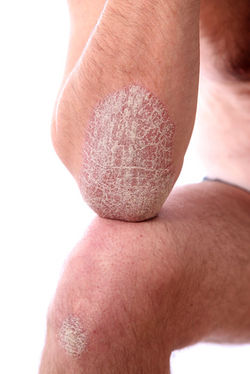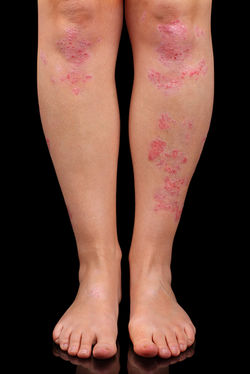Psoriasis
|
Psoriasis | |
| Causes | Dietary Factors, Infections, Stress |
|---|---|
| See Also | Dermatology / Skin Conditions, Dry Skin, Psoriatic Arthritis, Hypothyroidism, Autoimmune Disease |
| Books | Books on Skin Diseases |
| Articles | Articles on Dermatology / Skin Conditions |
Psoriasis is a very common inflammatory skin disorder. It is caused by the skin cells on the surface of the skin replicating too rapidly which forms scales which are silvery and dry, red, itchy patches which can be painful. Psoriasis is often considered a chronic condition with periods of improvement or remission alternating with periods of aggravation.[1]
Naturopathic Assessment
| Article | Psoriasis & Pathophysiology, Conventional, and Alternative Approaches to Treatment , Alt Med; 2007;Vol12(4) |
|---|
| Check out this book | The Clear Skin Diet |
|---|
Assessment and diagnosis of psoriasis is typically based on the inspection of the skin lesions themselves. A detailed history and diagnostic testing is often required to confirm the causal factors.
Causal Factors
The causes of psoriasis are varied. Overall it is due to a disturbance or reaction of the immune system that is being expressed through the skin.
Lifestyle
- Food intolerances can trigger or aggravate psoriasis.
- Protein maldigestion
- Excess animal fat consumption
- Alcohol use is implicated in development of psoriasis in both females and males and also interferes with treatment response [2].
Social
- Emotional stress is a common trigger and aggravating factor.
Environmental
- Infections such as streptococcal infection and Candida, can be a trigger.[3]
- Bacterial or viral infections, including strep throat or upper respiratory infections can cause or trigger a flare up of psoriasis.
- Weather
- Dry air ,too much sunlight (burn and too little sunlight are all associated with increased risk of psoriasis.
External
- Trauma
- Injury to the skin, including cuts, burns and insect bites all increase the risk of psoriasis in the affected area.
Medical Interventions
- Prescription Medications
- Certain medications, such as lithium, beta-blockers, antimalarials, and corticosteroid withdrawal can cause psoriasis. [3]
Genetics and gestational factors
- Psoriasis tends to run in familities. [3]
Diagnostic Tests
- Auspitz sign is positive
- High Eosinophils are common
- Liver Enzymes are typically monitored throughout treatment.
Related Symptoms and Conditions
- Dry skin predisposes an individual to skin conditions such as psoriasis.
- Arthritis, especially psoriatic arthritis is found in 5 to 8 percent of the psoriatic population.[3] Some believe that psoriasis is associated with a tendency for an autoimmune condition.
Psoriasis can be quite debilitating when it is associated with arthritis.
- Onycholysis or separation of nail from nail bed can occur.
- Depression and social isolation can be associated with severe or debilitating psoriasis.
- Hypothyroidism
- Candida
- Autoimmune disorders such as rheumatoid arthritis
- Liver dysfunction
- Cancer and cancer treatments such as chemotherapy.
Characteristics
Psoriasis usually develops slowly, following a typical course of remission and recurrence. The general characteristics and symptoms include:[1]
- Onset is usually before the age of 20, but can occur in at any age.
- Psoriasis is not contagious.
- It can range in severity from one or two lesions to a full-body.
- inflammatory condition due to abnormal T lymphocyte function.
- The skin is typically irritated, dry and red. It can be itchy, but not always.
- Flaky silvery scales or papules appear in patches on the skin in round or oval configuration.
- Thickening of the epidermis of the skin
- The area can be painful especially if associated with other condtions.
- Psoriasis typically involves the elbows, knees and scalp.
- 1/3 of those with psoriasis have nail involvement. Other areas include external ears, nails, eyebrows, back and skin folds.
There are five types of psoriasis: [3]
- Plaque: is the most common form and typically involves white scaly patches on red skin.
- Guttate: is an unstable form associated with sudden appearance of numerous psoriasis-like papules on the trunk. Often associated with group A streptococcal pharyngitis, viral infections, and --less often-- with systemic steorid withdrawal.
- Inverse: an uncommon form that may occur in the groin and under the breasts. Defined by smooth, red and sharply defined plaques. May be associated with diabetic patients, those individuals with a candida infection or due to topical steroid use.
- Pustular: an uncommon severe form associated with fever and tenderness. May be drug related.
- Erythrodermic: an uncommon form that involves total body redness with chills and skin pain. May be drug related.
Common Questions
When assessing psoriasis your naturopathic doctor will examine your skin and inquire about the following:
- When did your psoriasis develop?
- Is it acute or chronic?
- What makes it better or worse?
- What are your hygiene habits?
- What other symptoms are associated with the psoriasis?
- What impact does it have to your health and activities of daily living?
- What are your other health concerns?
Naturopathic Treatment
The goal of naturopathic treatment is to support and work in tandem with the healing power of the body and to address the causal factors of disease with individual treatment strategies. Psoriasis is a chronic disease.
It is always advisable to work with a naturopathic doctor before engaging in any treatment plan.
Home Care
Home Care strategies include:
- The first step of any treatment plan is to maintain a diary of symptoms tracking diet, activity level, stress and other outside influences that may be triggering a flare-up.
- When washing or bathing use cooler water. Brief exposures to water are best.
- Do not scrub or dry the skin too hard or for too long.
- After bathing use a chemical-free, natural moisturizer.
Avoid Scratching
- Scratching open a healing lesion may result in scarring and may enlarge the rash.
- The use of chemical-free, natural moisturizers can decrease the inflammation and itching.
- Keep fingernails, especially a child's, cut short to minimize additional skin damage due to scratching.
Other Home Care Strategies
- Use chemical-free soaps and cleaners. Avoid anything that is known to cause, irritate or aggravate the skin.
- Avoid rough-textured or irritating clothing.
- A humidifier may assist in decreases the dryness of the skin.
- Stress relief through exercises, mindfulness or meditation are often beneficial.
- Increase the skin's exposure to sunlight.
Lifestyle
- Dietary recommendations
- The most important step is to identify and elimiate food allergies or intolerances. Most individuals improve with an elimination diet.[5] Cow's milk is the primary culprit. Other key food allergens in eczema are eggs, tomatoes, peanuts, and food preservatives and food colourings. To a lesser extent fish, soy, wheat, citrus, and chocolate.[6], [5] The exact food triggers is very individual. Tracking what you eat and your skin's reaction is often beneficial in identifying triggers.
- Eliminate intake of alcohol, caffeine, spicy or greasy foods, sugar and chocolate.
- Ensure a high fiber diet.
- Consume green and yellow vegetables rich in Beta-carotene.
- Ensure you drink adequate water.
Naturopathic Therapies
The prescribing of naturopathic therapies requires the guidance of a naturopathic doctor as it depends on a number of factors including the causal factors, a person's age, prescription medications, other conditions and symptoms and overall health. It is always advisable to work with a naturopathic doctor prior to taking any natural therapies.
Naturopathic Therapies for psoriasis include:
- Clinical Nutritional Supplementation includes
- Vitamins such as Vitamin A, Beta-carotene, Vitamin C, Vitamin D, Vitamin E, Vitamin B12, Folic Acid
- Minerals such as Chromium, Selenium, Zinc
- Amino Acids such as
- Other supplements such as Flax Seed Oil, Essential Fatty Acids, Phosphatidylcholine, Betaine HCL, Omega-3 Fatty Acids
- Herbs such as Calendula (Calendula officinalis), Cleavers (Galium aparine), Sarsaparilla (Smilax spp), Goldenseal (Hydrastis candadensis), Gota kola (Centella asiaticia), Yellow Dock (Rumex crispus), Milk Thistle (Silybum marianum), Aloe (Aloe vera), Olive (Olea europaea), St. John's Wort (Hypericum perforatum), Turmeric (Curcuma longa)
- Herbs that may be beneficial as a tea include Burdock (Arctium lappa), Red Clover (Trifolium pratense) and Yellow Dock (Rumex crispus).
- Herbs are chosen depending on the specific causes and characteristics of the psoriasis. The actions include: Alterative, Anti-inflammatory, Lymphatic,Nervine, Diuretic, Hepatic, Vulnerary, Astringent,Emollient, Antipruritic, and Diaphoretic.[7]
- Diaphoretic herbs aid the skin in the elimination of toxins and promote perspiration.
- Herbs that may be contraindicated include: Dandelion (Taraxacum officinale).
- Gemmotherapies such as Cedrus libani, Ilex aquifolium, Platanus orientalis, Ribes nigrum, Secale cereale, Tilia tomentosa
- Homeopathy is often used both as a classical homeopathics and as complex homeopathics in the treatment of psoriasis. Common remedies include: Staphysagria.
- According to Traditional Chinese Medicine, psoriasis is caused by blood dryness due to pathogenic wind.[8]
- Sauna Therapy
- Alternative hot and cold on the affected area can assist with healing.
References
Reviewed by Iva Lloyd, BScH, RPE, ND [1]
- ↑ 1.0 1.1 Habif Thomas (2005) Skin Disease, Diagnosis and Treatment Elsevier Mosby.
- ↑ Kazakevich N, Moody MN, Landau JM, Goldberg LH (2011) Alcohol and skin disorders: with a focus on psoriasis Skin Therapy Lett;16(4):5-6 PMID: 21611681
- ↑ 3.0 3.1 3.2 3.3 3.4 Campbell James, Chapman Shane, Dinulos James, Zug Kathryn (2005) Skin Disease, Diagnosis and Treatment, Elsevier Mosby
- ↑ Gisondi P, Rossini M, Di Cesare A, Idolazzi L, Farina S, Beltrami G, Peris K, Girolomoni G (Mar 2012) Vitamin D status in patients with chronic plaque psoriasis. Br J Dermatol.;166(3):505-10. PMID: 22013980.
- ↑ 5.0 5.1 Murray Michael Atopic Dermatitis (eczema) Natural Medicine Journal, 1999 Vol2:4
- ↑ Murray Michael 1996 Encyclopedia of Nutritional Supplements, The Essential Guide for Improving Your Health Naturally Prima Publishing
- ↑ Hoffmann David (1992) Therapeutic herbalism: A correspondence course in phytotherapy.
- ↑ Flaws B, Jian-Hui L (1993) A Handbook of Traditional Chinese Dermatology. Blue Poppy Press.


